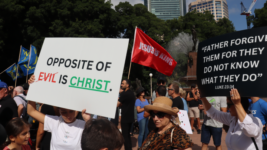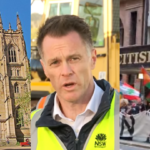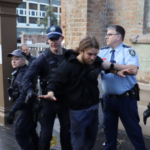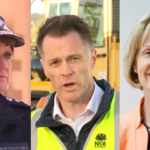NSW Government Expands Antiprotest Laws to Cover Places of Worship

The Minns government has kicked off the 2025 NSW parliamentary term with the introduction of new antiprotest laws to prohibit demonstrations from taking place outside of places of worship. And these laws are being delivered in response to rising “antisemitic” vandalism and firebombing attacks that have involved synagogues, yet they will affect demonstrations outside of all places of worship.
Introduced on 11 February 2025, the Crimes Amendment (Places of Worship) Bill 2025 inserts two new criminal offences into the Crimes Act 1900 (NSW) to make protesting out the front of churches, temples and any other places of worship a crime and it also broadens policing powers, so that NSW police officers can move demonstrators on, when they are protesting outside of places of worship.
“Recently, we have seen disgraceful acts targeting synagogues in NSW and other Australian jurisdictions,” NSW attorney general Michael Daley said, in opening his second reading speech on the bill. And he went on to list as reasons the 6 December 2024 arson attack on the Adass Israel Synagogue of Melbourne, along with the vandalising of two synagogues in Sydney suburbs.
However, the recent attacks on synagogues are a far cry from the nonviolent demonstrations NSW premier Chris Minns appears to have his eye on outlawing, and rather than have any major effect on rallies outside of synagogues or mosques, a NSW ban is, for the most part, set to impinge upon the rights of people who want to protest outside Christian churches in respect of child sexual abuse.
And while the NSW attorney general went on to explain that he’s drafted the laws in such a way as to ensure that “lawful, peaceful protests outside of places of worship” can continue, critics of the move warn that this is exactly the type of demonstrations the NSW government is currently attempting to stamp out.
Yet another protest ban
“We must always strive towards a more cohesive and inclusive society, but these new laws are extreme and completely unnecessary,” said NSW Greens MLC Sue Higginson. “The laws are overreach and the only purpose they serve is to further criminalise peaceful and legitimate protests.”
“Premier Chris Minns has proven again that he is a one-trick pony when it comes to law-and-order crackdowns that are announced through conservative radio interviews,” the Greens justice spokesperson added.
The state government announced it would be legislating another plank of the 2022-established NSW antiprotest regime, after a group of peaceful demonstrators rallied outside of Sydney’s Great Synagogue on 4 December 2024, as it was holding a function on behalf of Technion, the Israel Institute of Technology, and they were protesting the institution’s complicity in the Gaza genocide.
The protest, which was the type of demonstration the AG is suggesting will continue to be protected under the new antiprotest laws, occurred right before the firebombing of a Naarm-Melbourne synagogue and the conflation of the two incidents in the media storm that followed, made the NSW Labor suggestion to ban protests outside of places of worship sound like a reasonable proposition.
“The premier has ignored the Law Reform Commission report that he commissioned into hate crime laws, a report that recommended against these changes,” Higginson added, “and he is ignoring his own colleagues who know that these changes will entrench hate against marginalised communities in favour of some of the most powerful religious organisations in the world.”
The guts of the bill
The Places of Worship Bill, which is yet to be debated in NSW parliament, inserts new section 214B into the Crimes Act.
Subsection 214B(1)(a) contains the offence of intentionally blocking, impeding or hindering a person accessing or leaving a place of worship, while subsection 214(1)(b) contains the other new offence of harassing, intimidating or threatening a person accessing or leaving a place of worship.
These two crimes would carry the signature penalties of the NSW antiprotest regime, which comprise of a $22,000 fine and/or 2 years imprisonment.
The section 214B(1)(a) offence does not pertain to a person whose conduct “forms part of industrial action or an industrial dispute or campaign” or occurs outside NSW parliament or an MP’s office or if the demonstration has the consent of the NSW police commissioner or the person in charge of the place of worship has greenlighted the protest.
New section 214C of the Crimes Act will ensure that the minister reviews the operation of the laws contained in the new bill after they’ve been in action for a period of 2 years.
Another amendment involves the insertion of a new section into the Law Enforcement (Powers and Responsibilities) Act 2002 (NSW), which is the legislation that contains the majority of policing powers that NSW police exercises, and the legislation is also referred to as the LEPRA.
The Places of Worship Bill inserts new subsection 200(5) into the LEPRA, which provides NSW police officers with the power to direct demonstrators protesting outside of a place of worship to move on.
The NSW antiprotest regime
The antiprotest regime began with an on-air March 2022 conversation between then NSW roads minister Natalie Ward and 2GB Radio shock jock Ben Fordham, about how the minister had arrived late to work on that particular day due to a climate protest and the radio host suggested that “severe” penalties should apply, which was an idea the then Perrottet government ran with.
At the time, there was a spate of unauthorised climate protests being carried out across Greater Sydney by climate defence groups Blockade Australia and Fireproof Australia.
The NSW antiprotest regime passed through NSW parliament on 1 April 2022, and it comprises of a prohibition on unauthorised protests that obstruct major roads, tunnels, bridges or major facilities in Greater Sydney, Wollongong and Newcastle, with those convicted facing up to 2 years inside and/or a fine of up to $22,000.
The roll out of the new laws was accompanied by a heavy-handed crackdown by NSW police, especially in response to the June 2022 Blockade Australia protests on Gadigal land in Sydney, and in the wake of its enactment the NSW antiprotest regime did have a significant chilling effect on unauthorised protests in NSW.
However, on 24 November last year, over two hundred people on kayaks breached a line drawn in the water by NSW police, so that they entered and blocked the shipping lane leading into Newcastle Coal Port, and they did this despite the threat of the draconian laws, and 138 people were charged with obstructing a major facility.
So, this recent event appears to show that the general deterrent effect that applied to the antiprotest regime initially, now seems to be waning.
Ending protests outside of churches
“This is a serious overreach of power by the NSW government,” said NSW Council for Civil Liberties (NSWCCL) president Timothy Roberts in a statement on Wednesday. “These laws are clearly unconstitutional and will be rightly challenged at great expense to the taxpayer.”
The NSWCCL further warns that these laws are likely to impinge upon members of the Christian church, who seek to demonstrate against the sexual abuse of the clergy outside of churches that they too worship within.
The fact that the law will stop protests outside of Christian churches in respect of protesting child sexual abuse is the main gripe being raised in relation to these laws, as demonstrations outside of synagogues or other places of worship are rare.
“Religious institutions exercise significant and overt political power in Australian politics, and this makes them a legitimate site of protest in a democratic society,” Roberts set out.
“Protest is an essential way for ordinary people to stand up to those with far more power than them. That includes religious institutions, who overtly engage in the political system,” the civil liberties advocate said in ending.







